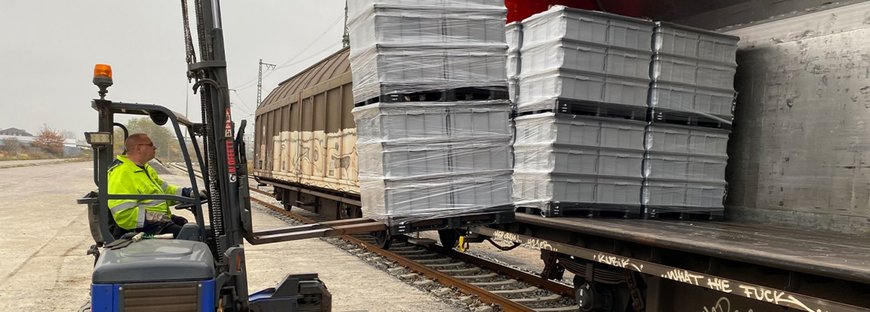www.industryemea.com
04
'22
Written on Modified on
Webasto Expands Successful Logistics Project With DB Cargo
Test phase shows: CO2 reduction of more than 75 percent possible for transports.

At the end of last year, Webasto tested shipment by rail of supplier parts for production at its plant in Mecklenburg-Western Pomerania. A key result of the pilot project with DB Cargo Logistics and freight forwarder Gertner (Altentreptow) is that by using goods trains instead of trucks, the carbon dioxide emissions of shipments from and to the Neubrandenburg site can be reduced by at least three quarters without incurring additional costs.
Moreover, all of the wagons arrived on time at the respective loading and unloading stations in Germany and abroad during the test phase. “Sustainability is an important criterion in the design of our future service and supply chains. At the same time, the automotive industry in particular demands the highest level of reliability and cost-efficiency. Our test run delivered convincing results on all of these points. We have therefore decided to extend the project to include other partners,” explains Andreas Dikow, Plant Manager at Webasto Neubrandenburg.
Two Webasto vendors from southern Germany and the Czech Republic were involved in the first phase of the project “from road to rail”. Within six weeks Webasto sent around 1,400 empty transport containers to them to be filled and returned. In this way, some 15 per cent of the purchased volume of components used in the electric heating systems manufactured at the plant had, by the turn of the year, reached the production in Neubrandenburg almost exclusively by rail.
Previously, these supplier parts had been transported over 1,200 or 1,400 kilometers entirely by truck. Since the suppliers – unlike the Webasto site in Mecklenburg-Western Pomerania – are not located in the immediate vicinity of rail terminals, vans were still used to cover about five percent of the routes. Following completion of the successful initial test phase, the delivery of goods by rail from these two suppliers will shift to regular operation this spring.
In order to consistently further reduce its emissions and exploit the efficiency potential of shipping larger volumes by rail, Webasto is now planning to involve further suppliers from Germany, the Czech Republic, Hungary and Romania in the logistics project. The next test phase is scheduled for the second quarter of 2022. In the medium term, more than 50 percent of all heating components for the Neubrandenburg plant are to be delivered by rail.
In parallel, the automotive supplier is working with DB Cargo on a rail-based freight transport connection between the Neubrandenburg and Wuhan (China) Webasto sites. The prerequisites for this would be in place: “If we were able to use the rail track directly adjacent to our company premises for loading freight cars heading to Wuhan, shipments to and from our other electric vehicle heating system production facility there could take place fully by rail. This would be a forward-looking perspective not only in terms of our Neubrandenburg site’s carbon footprint, but also for the entire Webasto Group,” explains Dikow.
www.webasto-group.com

